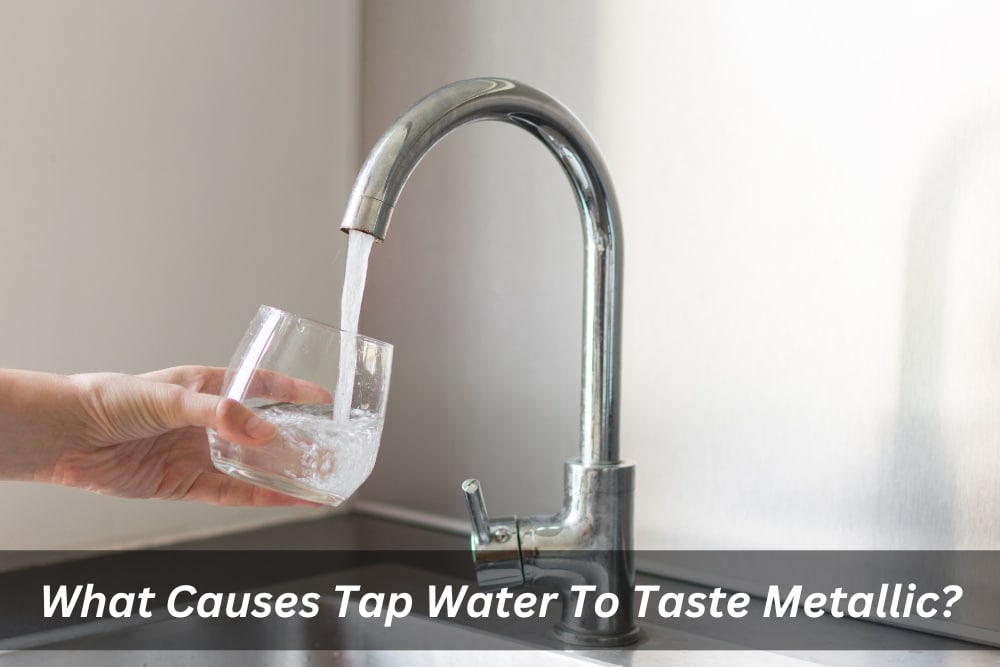What Causes Tap Water To Taste Metallic?

Ever take a sip of your tap water and recoil at a strange, metallic taste? You’re not alone. This unpleasant surprise can leave you wondering what’s lurking in your glass and if it’s safe to drink. Fear not, water warrior! Let’s delve into the reasons behind metallic tap water and explore solutions to get you back to enjoying refreshing, worry-free sips.
Should you be worried? Is metallic taste in tap water safe?
Relax, in most cases, a metallic taste doesn’t necessarily indicate harmful contamination. However, it’s a flag worth investigating. This taste can arise from various factors, some requiring simple fixes, while others might warrant further action.
Here’s the breakdown:
- Generally safe: Often, the culprit is mineral content like iron, copper, or manganese, naturally occurring in water sources. Often, the culprit is mineral content like iron, copper, or manganese, naturally occurring in water sources. While they might affect taste, these minerals are usually within safe limits set by health regulations.
- Potential concerns: In rare cases, high levels of certain metals like lead can be harmful. Additionally, acidic water can leach metals from pipes, posing health risks.
Tip: If the metallic taste is intense, persistent, or accompanied by other concerns like discolouration, it’s wise to get your water tested. Look for local water testing services or contact your water supplier for guidance.
What is the source of the metallic tap water taste?
Now, let’s crack the case of the metallic culprit:
- The plumbing suspects:
- Leaking joints: Loose or damaged pipe connections can allow tiny air bubbles to enter the water. These bubbles can react with metals in the pipes, creating a metallic taste and sometimes even a faint metallic odour.
-
-
- Rusty pipes: Imagine your pipes as the highways for your water. Corroded or old pipes, especially those made of copper or galvanised steel, can release metallic particles into your water. This is more common in older homes or areas with aggressive water chemistry. In some cases, replacing these pipes with newer materials could be a solution, but it’s crucial to consult a qualified plumber to assess the extent of the issue and determine the most appropriate course of action.
-
- Mineral mayhem:
-
-
- Iron overload: Iron is a common mineral in water, and while essential in small amounts, excess iron can cause a metallic, blood-like taste. This is more prevalent in well water, where iron levels can fluctuate depending on the geology of the area.
- Copper cacophony: Copper pipes can leach copper into the water, especially if they are new or if the water is acidic. While copper is also a beneficial mineral, high levels can create a metallic, bitter taste.
- Manganese mischief: Manganese is another naturally occurring mineral that, in excess, can contribute to a metallic taste, often described as astringent or puckering.
-
- Chemical culprits:
-
- Chlorine clash: Chlorine is commonly used for water disinfection. While generally safe, it can react with certain metals in pipes, creating a temporary metallic taste. This is more noticeable when the water has been sitting stagnant for a while.
- Chloramine confusion: Some water treatment plants use chloramines instead of chlorine. While effective, chloramines can also interact with metal pipes, leading to a metallic taste, particularly in hot water.
Beyond the pipes: External factors causing metallic taste
While plumbing and minerals are usual suspects, other factors can play a role:
- Stagnant water: If you haven’t used your tap for a while, the water sitting in the pipes can develop a metallic taste. Run the tap for a few minutes to flush out the stagnant water and improve the taste.
- Your taste buds: Believe it or not, your taste perception can fluctuate. Recent medications, other foods or drinks, or even illnesses can temporarily alter your taste sensitivity, making water seem metallic.
Banishing the bite: Solutions for a refreshing, metallic-free sip
There are ways to conquer that metallic foe and enjoy delicious tap water:
- Filter magic
-
-
- Targeted filtration: Ditch the one-size-fits-all approach. Invest in an NSF-certified filter specifically designed to address your water’s metallic woes. Look for filters that target iron, copper, manganese, or chlorine, depending on your identified culprit. Consider reverse osmosis systems for comprehensive filtration or under-sink filters for convenient point-of-use treatment.
- Activated carbon heroes: Activated carbon filters are champions at absorbing various impurities, including those causing a metallic taste. Choose filters with a high capacity for maximum effectiveness.
- Maintenance matters: Remember, even the best filters need TLC. Replace cartridges regularly as per the manufacturer’s instructions to maintain optimal performance.
-
- Flush it out
-
-
- Stagnant water blues: Don’t let your water become a breeding ground for metallic taste. Regularly run the tap for a few minutes, especially after periods of non-use. This flushes out stagnant water and brings in fresh, delicious goodness.
- Morning metallics: Notice the taste is stronger in the morning. That’s likely due to water sitting in the pipes overnight. Running the tap for a minute or two before filling your glass should do the trick.
- Embrace the chill
- Fridge factor: Did you know refrigeration can be your taste bud’s ally? Store your water in a pitcher or filtered water bottle in the fridge. The cooler temperature numbs taste receptors slightly, making the metallic taste less noticeable. Plus, who doesn’t love a refreshing chilled sip?
-
- Citrusy saviour
-
- A natural twist: Add a squeeze of lemon or lime to your water. The acidity helps mask the metallic taste while adding a delightful zing. Experiment with other citrus fruits like grapefruit or oranges for a flavour twist.
- Bonus benefit: Vitamin C boost! Adding citrus not only enhances taste but also adds a healthy dose of vitamin C, supporting your immune system.
- Professional help
- When DIY falls short: If the metallic taste persists despite your efforts, consider seeking professional help. A plumber can assess your pipes for corrosion or leaks, while a water quality specialist can provide a detailed analysis of your water source and recommend tailored solutions.
Conclusion
Remember, in most cases, a metallic taste in tap water isn’t harmful. However, understanding the cause and taking action can give you peace of mind and ensure you’re enjoying the best-tasting water possible. If you’re concerned or the metallic taste persists, don’t hesitate to get your water tested.
For residents in Sydney experiencing blocked drains or water quality issues, Sydney Blocked Drain Service is here to help! We offer professional drain cleaning, pipe replacement, and repairs and maintenance to ensure your home has a constant flow of clean, delicious water. Contact us today and let’s banish that metallic taste for good!



